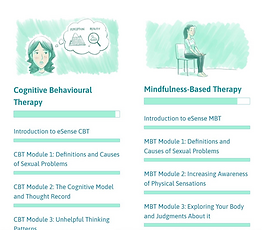Empower Your Patients with Access to Evidence-Based Sexual Health Support
Many women struggle with sexual concerns—yet few clinics have the resources to treat them. eSense makes it easy to provide proven support without adding to your clinical workload.
.png)




.png)
Introducing eSense
Created by clinical psychologists and global leaders in sexual health, eSense is a self-guided digital program that delivers evidence-based support women can access privately, at their own pace, and on their own terms.
Clinically-validated program offering two science-backed approaches: Cognitive Behavioural Therapy (CBT) and Mindfulness-Based Therapy (MBT)
Each treatment pathway includes engaging, interactive modules with video, audio, exercises, and real-life examples
Optional support from trained non-expert “navigators” for encouragement, clarification, and accountability
Entire program costs less than two in-person therapy sessions

Improves Access
Breaks down barriers like stigma, geography, cost, and the shortage of trained providers.

Empowers Women
Builds self-awareness and provides lifelong tools to enhance sexual wellbeing

Flexible & Private
Designed for self-pace use in a private setting—improving comfort and adherence

Trauma-sensitive design
Shown to benefit women with a history of sexual trauma, including reduced trauma symptoms

Inclusive
Features diverse fictional case examples across age, culture, and life experience—with future adaptations planned for transgender women and others
Who eSense Helps
Up to 40% of women experience sexual concerns, yet fewer than 20% receive treatment—due to stigma, embarrassment, limited provider training, and a shortage of specialists. eSense bridges this gap with care women can trust.
eSense is appropriate for a wide range of women with sexual concerns including:
Menopausal and Perimenopausal Women
History of sexual trauma
Post-partum
Cancer survivors
Transgender women
Women without access to therapists
.png)
How it works
.png)
Recommend eSense to your patient during a consultation.
.png)
Your patient completes the self-guided CBT or mindfulness program—privately and at their own pace
.png)
You gain confidence knowing they’re supported by evidence-based, clinically validated care.
Why Partner with eSense?







Clinical
Results
eSense has been shown to be effective across multiple clinical studies, with results from a pivotal randomized controlled trial (RCT) published in Behaviour Research & Therapy.
Large statistically significant improvements in sexual
desire/arousal (effect sizes d=0.90 to 1.13) and reduced sexual distress (d=-0,62 to -1.00), compared to control.
Outcomes comparable to in-person therapy
Results sustained at 6 month follow up.
Improvements in sexual satisfaction and overall sexual function were also substantial (d=0.70 to -1.23)
Only 20% attrition, well below average for digital health
programs.
High usability scores:
-
Ease of navigation 8.3/10
-
Helpfulness 8.1/10
-
80% were somewhat to very satisfied with the
experience
CBT and MBT tracks performed similarly, indicating
both are effective treatment options.
Participant demographics
50%
history of
sexual assault
43yrs
average age
129
total participants
17%
were on menopausal hormone therapy
15yrs
average relationship duration
13%
prior treatment
for sexual difficulties
Testimonials
I’ve learned so much about myself—and so has my partner. The tools eSense provides have had a profound impact, changing the way we relate, communicate, and connect physically.
eSense helped me challenge negative thoughts around my sexuality—and those skills carried into other parts of my life. I finished the program feeling more empowered, more connected to my body, and more open to positive and enjoyable sexual experiences.
eSense brought out the possibilities that I could live a life of intimacy that was healthy, without shame. I never thought I would feel this kind of freedom.
Meet the experts behind eSense

Lori Brotto
Ph.D., Clinical Psychologist
Co-founder & President
Canada Research Chair in Women’s Sexual Health
Executive Director, Women’s Health Research Institute
Professor, Division of Gynaecologic Specialties, University of British Columbia


%20(1).png)